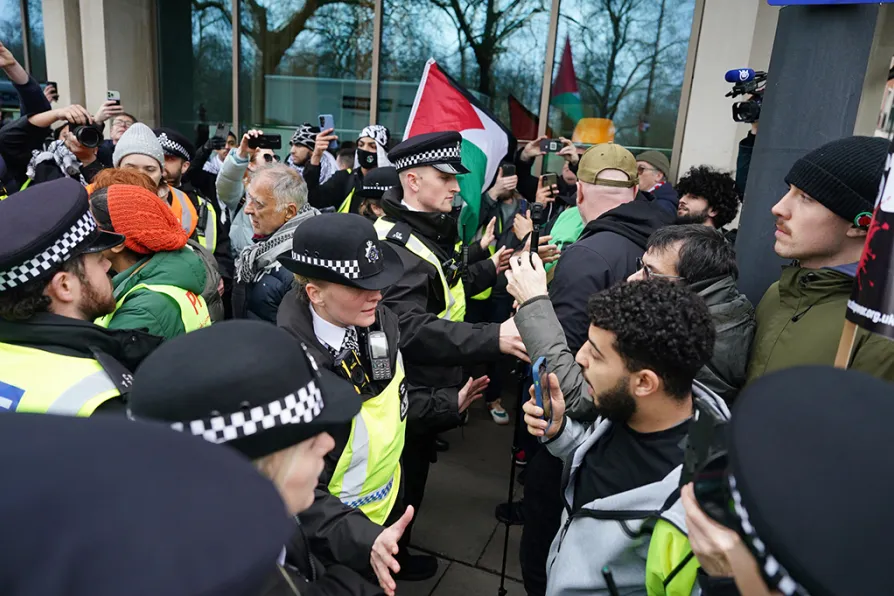CHRISTMAS 2025 is celebrated under the shadow of the hunger strikers imprisoned in British jails because of their solidarity with the Palestinian people.

 Police clash with Palestine solidarity demonstrators in London yesterday
Police clash with Palestine solidarity demonstrators in London yesterday
CALLS from the Commissioner for Countering Extremism for “faster and bolder” crackdowns on dissidents are a dangerous sign of the times.
They encourage the increasing tendency for police to arrest people for expressing political opinions and reflect a longer-term trend in which contentious policy interventions are disguised as objective advice from independent experts.
Suella Braverman’s clumsy bid to ban the enormous peace demonstrations which have taken place since Israel’s invasion of Gaza may have backfired, but a quieter and steadier tightening of repressive policing of the demos is creating a new normal with chilling implications for free speech.
The Morning Star’s political reporter Andrew Murray has recently detailed the shocking persecution of demonstrators for handing out pamphlets the police object to, and Parliament’s supine agreement to a government ban on the entirely peaceful Islamist organisation Hizbut Tahrir, pointing out the need to fight this state overreach whatever we think of the organisations involved.
Last week the courts joined the bid to intimidate protesters with a shocking conviction of three Palestine solidarity demonstrators on terrorism offences — for wearing stickers with an image of a paraglider on them, even though the judge acknowledged there was no indication any of them intended this as a statement of support for Hamas (some of whose fighters entered Israel on paragliders during its October 7 attack on the country).
They were not imprisoned, but the verdict — based as it was on vague and contested claims as to what image was being displayed and what it meant — will make people fearful of demonstrating and paranoid about what imagery or placard wording the police will decide is extremist next.
We know the anti-extremism commissioner Robin Simcox is referring to the Palestine demonstrations when he calls for harsher clampdowns, since he praises “some of the legislation around protests” and government attacks on the Boycott, Divestment & Sanctions (BDS) campaign before demanding it go further and faster.
He also makes an ominous reference to looking out for “abuse of broadcast licence by extremists,” which suggests he is considering how it can restrict news access to state-sanctioned narratives only — something already largely achieved over the conflict in Ukraine, as observed by veteran political analyst Noam Chomsky. Turkey has demanded Sweden ban Kurdish resistance spokespeople from its TV channels in return for backing its Nato membership bid: Simcox’s words hint at a similar forced disappearance of Palestinian voices.
Simcox is presented as a neutral analyst of extremism. As his embrace of highly contentious policies like the BDS crackdown shows, he is anything but: this former Henry Jackson Society researcher and Margaret Thatcher Fellow at the Margaret Thatcher Centre for Freedom is a neoconservative, well, extremist.
It suits the government to push its authoritarian line through an ”independent” commissioner because the casual observer is less likely to realise we are dealing with incendiary suggestions that will permanently erode our civil rights.
Ironically the Commissioner for Countering Extremism role was set up by Theresa May following the Manchester Arena bombing — which was carried out by a bomber, Salman Abedi, whose travel between Britain and Libya was facilitated by MI5 in pursuit of the foreign policy goal of overthrowing Colonel Gadaffi.
The way to protect citizens from such extremism, as explained in a powerful speech by then Labour leader Jeremy Corbyn, is to stop pursuing a foreign policy based on violent destabilisation of the Middle East.
To Establishment horror, polls showed most people agreed with Corbyn. To its horror today, the continued mass mobilisations for Gaza show people in Britain are furious at our government’s support for genocide.
Its answer is repression. The left needs a better understanding of the class character of the state, and the need to oppose laws that allow it to decide what speech is hateful or extreme.
A true anti-racist movement must be built from communities up: our rulers only deploy such concepts for political ends.














